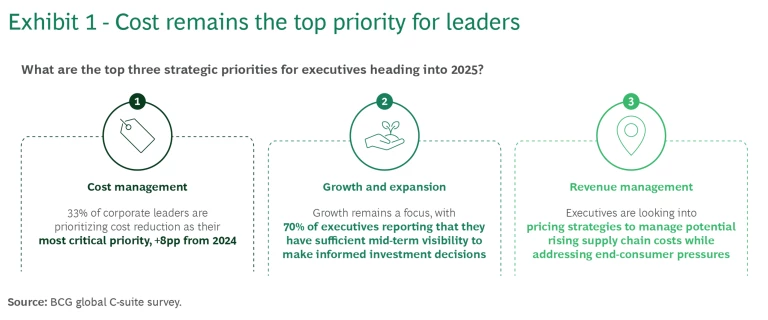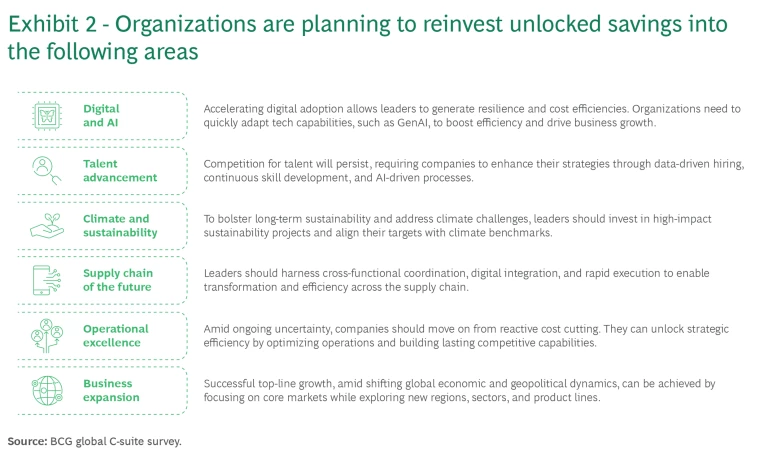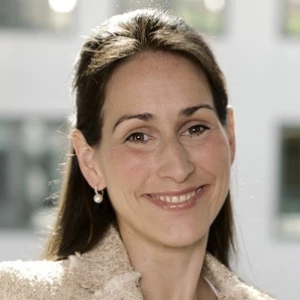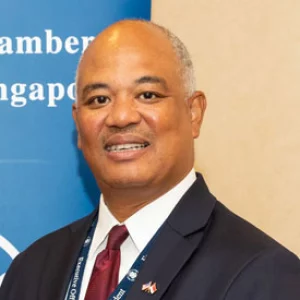Our annual survey of over 570 C-suite executives across regions and industries reveals that many of the world’s corporate leaders feel uncertain about the economy. They are particularly concerned about geopolitical stability and are following global conflicts and trade tensions closely.
These leaders are also uneasy about potential tariffs and policy shifts enacted by the new US administration. We found that 85% of executives were already moving to address potential market disruptions, with 54% actively monitoring the situation and 31% saying they have launched contingency plans, such as tariff responses and supply chain redesigns.
Nevertheless, some leaders are expressing cautious optimism as they search for opportunities to innovate and grow. Given recent inflation and rising interest rates, unlocking new efficiencies will be central to this effort. It remains a primary goal for corporate leaders, as it did in 2024 and 2023. In fact, one-third list cost as their most critical priority—up 8 percentage points (pp) year-on-year.
Cost Is King
Our respondents achieved only an average of 48% of their cost-saving targets in 2024, and most say their companies struggle to maintain cost efficiencies beyond two years after the initial effort. Still, many of those surveyed aim to implement and sustain savings in 2025, recognizing that lowering costs is vital to achieving their strategic objectives. (See Exhibit 1.) In fact, BCG research shows that companies falling short of their cost targets tend to underperform on total shareholder return by an average of 9 pp, compared to the average TSR of peers that meet their targets.

Although most executives share this goal, we find individual companies tailoring their responses to strengthen their unique competitive advantage, including optimizing supply chains and streamlining product portfolios for greater cost efficiency. For example, some are generating cost efficiency and resilience by transforming every aspect of the supply chain , from product development and planning to procurement , logistics, and warehousing.
Key challenges include cultural resistance to cost-saving measures, along with the difficulty of changing a company’s structure and processes. Yet firms with an aligned culture and agile management tend to achieve up to 11% more efficient production processes—reducing the resources needed and therefore the costs allocated to them. A cost-conscious culture defined by employee buy-in, clear communication, and leadership transparency is essential to embedding cost awareness into a business’s daily operations.
Growth Remains in Focus
In the short term, businesses must manage costs and boost efficiency to free up cash and improve their margins. Nonetheless, many leaders want to invest in growth and expansion opportunities for the medium-to-longer term, including product innovation . In fact, 70% believe they have enough visibility into the medium-term future to make informed investment decisions and 67% plan to reinvest savings from their cost-reduction efforts accordingly. Others hope to use their savings to support strategic investments in areas such as talent advancement, sustainability, and operational excellence. And many plan to invest in AI and advanced analytics, as they see an opportunity to accelerate product development while further cutting costs in customer service, sales and marketing , and other areas. (See Exhibit 2.)

In a complex, challenging economic landscape, global executives are zeroing in on effective cost management as the primary tool for transformational change. They are prioritizing supply chain optimization and product portfolio simplification, tailoring their efforts to strengthen their market position in 2025 and beyond. And they are using the resulting savings to grow and optimize the core operations of the business, invest in digital and AI, and expand their scope into new regions, sectors, and product lines. Fostering a cost-aware and accountable organizational culture—and securing employee and leadership buy-in for it—will be key to achieving these goals.
BCG’s cost experts would like to thank Bastien Goetschel and Sandra Berger for their contributions to the shaping, research, and analysis of BCG's global C-suite survey. In addition, we are grateful for the additional local cost expertise of Matthias Tauber and Yahya Daraaoui.















